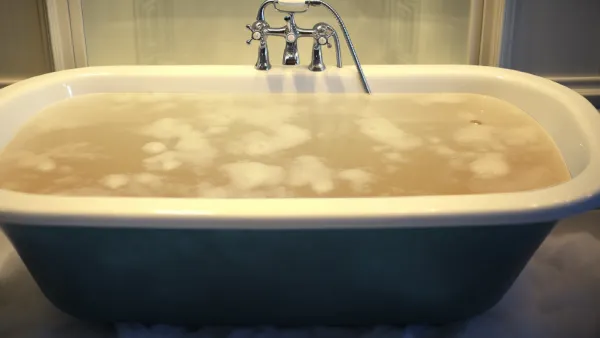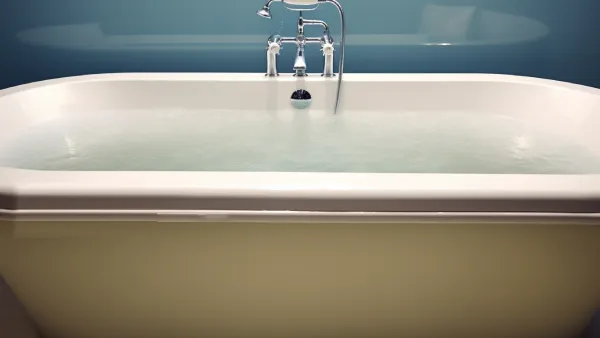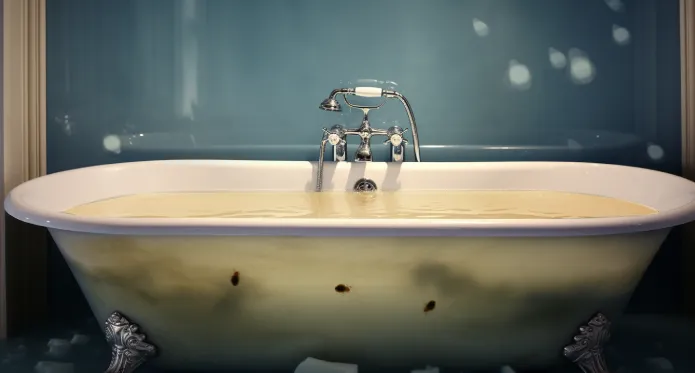Last Updated on October 17, 2023
Brown bath water is alarming, especially when expecting a relaxing and refreshing bathing experience. While the appearance of brown water can be unsettling, there are several potential explanations for this phenomenon, ranging from harmless occurrences to issues that require attention.
One potential cause could be sediment and mineral buildup in your pipes, leading to discolored water. Another possibility is rusty water pipes, where the corrosion can result in a brown tint. Disturbances in the water main or issues with your water heater could also contribute to the problem.
Here, we will discuss the possible causes and solutions to this common problem. You might be concerned about whether it’s safe to bathe in brown water or how long it takes to clear up. So, continue reading for an in-depth discussion.
Why Is My Bath Water Brown: Exploring Causes and Solutions

If you’re wondering why your bath water is brown, there are several possible reasons to consider, such as:
- Sediments and mineral buildup
- Rusty water pipes
- Water main disturbances
- Water heater issues
- Municipal water supply problems
- Pipe leaks and bacteria growth
- High mineral content in well pump water
Sediments and Mineral Buildup
Over time, minerals such as iron and manganese can accumulate in your water pipes and tanks. As water flows through these pipes, it can dislodge and carry these deposits, leading to brown or discolored water. Sometimes, these sediments and minerals can clog your pipes, causing water pressure issues and other problems.
So, what can you do to solve this issue? The first step is to run your cold water tap for about 20 minutes to help flush out any particles that may be causing the brown water. If the problem persists, consider installing a water softener or filtration system to help reduce mineral buildup in your pipes and tanks.
Rusty Water Pipes
Another common cause of brown water is corroded or rusted pipes. This is more common in older plumbing systems, where the pipes have had more time to corrode and wear down. As the pipes rust, they can release rust particles into the water supply, causing it to turn brown.
If you suspect rusty pipes may be the culprit behind your brown water, address the issue immediately. Regular plumbing maintenance and pipe inspections can help prevent further rust stain related problems.
Sometimes, you may need to replace corroded pipes with newer ones to ensure your water supply remains clean and free from contaminants.
Water Main Disturbances
When there is maintenance work or breaks in water mains, it can temporarily result in the presence of sediment and debris in your tap water. These disturbances can disrupt the normal water flow through the pipes, causing loose particles to enter your home’s plumbing system.
As a result, you may notice that your bath water appears brown or discolored. This is due to the suspension of these sediments in the water supply. While seeing brown water from your taps may be unsettling, this issue is usually temporary and will resolve itself as the water system stabilizes.
Water Heater Issues
If your brown water is more concentrated in your hot water supply, the issue may be related to your hot water heater. Sediment buildup in the water heater tank can lead to brown water, especially when using hot water.
To solve this issue, regularly flush your hot water heater tank to prevent sediment buildup. If the problem persists, consider contacting a professional plumber for maintenance or potential replacement of your water heater.
Municipal Water Supply Problems
When the municipal water supply is experiencing problems, it may result in temporary discoloration of your hot water. Fluctuations in water pressure or maintenance work within the system can introduce sediment and debris, which can cause your bathwater to appear brown.
This issue is usually temporary and should resolve itself without intervention. However, if you are consistently experiencing discolored hot water, contact your local water provider to inquire about any ongoing maintenance or disruptions in the water supply.
Pipe Leaks and Bacteria Growth
We rely on pipes that deliver clean water to our homes, but unfortunately, leaks in these pipes can lead to problems. They can introduce rust and other contaminants to your water supply and promote contamination by bacteria, which can lead to brown water.
If you suspect you have pipe leaks, address the issue promptly. The problem can deteriorate further, and the water quality can also suffer. A wise choice is to consult a professional plumber to assess the extent of the damage and recommend necessary repairs.
High Mineral Content in Well Pump Water
The well pump water has advantages but can also come with its share of problems, such as high mineral content. Excess minerals, specifically iron and manganese, can lead to brown discoloration, making it unappealing for everyday use.
Installing a filtration system specifically designed for well water can be a game-changer if you rely on well water. This water filtration system can remove excess minerals and provide clean water.
Is it safe to take a bath with brown water?
You shouldn’t bathe in brown water because it could harm your health just like green water. Brown water often indicates rust or high mineral content, which can lead to various health issues when exposed to the skin.
Rusty water may contain harmful bacteria and contaminants that can cause skin irritations, rashes, and even infections. Also, the high mineral content in brown water can leave a residue on your skin, leading to dryness and irritation.
How long does it take for brown water to clear?
Some issues (such as water main disturbances and municipal water supply problems) are typically resolved within a few hours. However, if you have a leak or sediment in your pipes, it may take several days for your water to return to normal.
It is advisable to avoid using hot water if possible during this temporary situation. This precaution helps prevent the discolored water from entering your water heater and potentially causing further problems.
How do you get rid of brown bath water quickly?

Consider installing a water filter system or a softener to eliminate discolored bathwater quickly. These solutions can effectively remove impurities and sediment from your water supply, ensuring your bathwater remains clean.
A water filter system traps contaminants such as rust, dirt, and minerals, preventing them from entering your plumbing system and turning your bathwater brown. Meanwhile, a water softener helps to reduce the levels of minerals like iron and manganese in your water, which are common causes of brown discoloration.
Get Rid of Brown Bath Water for Better Health
Brown bath water can stem from various factors, but most are manageable with the right solutions. Regular maintenance of plumbing systems, periodic flushing of water heaters, and water quality testing can all contribute to preventing or resolving brown water issues.
If you encounter persistent brown water or are unsure of the cause, don’t hesitate to seek professional assistance from a qualified plumber or water authority. By addressing the root causes, you can ensure clean, clear, and safe bath water for your household.

